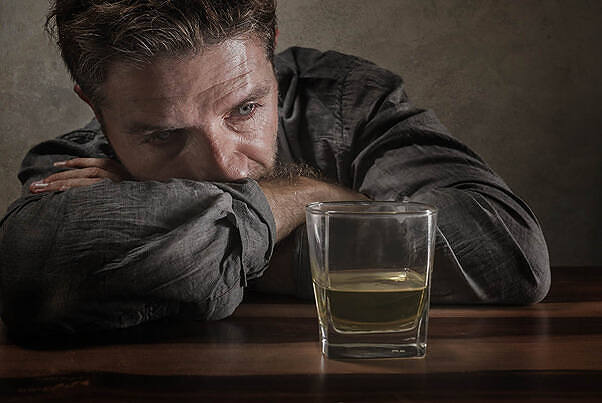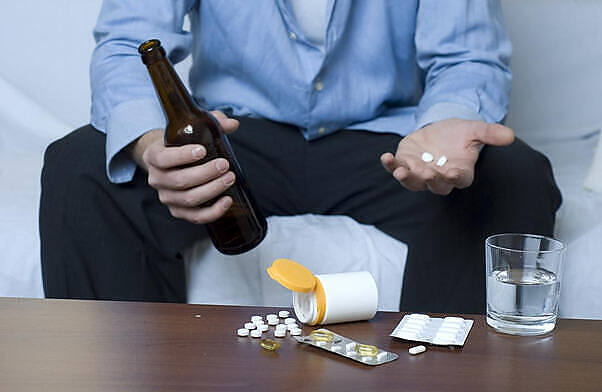The symptoms of alcohol withdrawal can pose a significant risk.
Discover the signs and appropriate actions to take if you encounter them.
Individuals who consume excessive amounts of alcohol and abruptly reduce or completely stop their consumption may encounter withdrawal symptoms.
These symptoms can pose a significant risk and should be considered a concerning indication of excessive alcohol intake.
Individuals will experience the side effects of alcohol withdrawal syndrome” if they are heavy drinkers and stop suddenly, leading to physical and psychological symptoms.
The extent of this may depend on the length and severity of your alcohol abuse and addiction and can gravely affect your health and well-being.
If you are concerned you might be dependent on alcohol, you should seek advice on how to cut down and stop your drinking safely.
These symptoms usually start 6 to 24 hours after the last alcoholic beverage. Severe symptoms can occur hereafter.

Severe symptoms
- Hallucinations (seeing, hearing, or feeling things that aren’t real)
- Seizures
- Delirium tremens, commonly known as ‘the DTs’
Did you know that 1 in 10 people with alcohol withdrawal syndrome will experience a seizure? [1]
Seizures
Seizures occasionally occur as a side effect of Delirium Tremens. However, seizures can happen outside the presence of the condition as well.
With alcohol withdrawal syndrome, generalized seizures and partial seizures are triggered in the brain and cause symptoms like blackouts, stiffness and intense jerking motions. These seizures are different from epileptic-style seizures because they are not triggered in the neocortex part of the brain.
Withdrawal seizures typically commence within 8 to 24 hours following the patient’s most recent consumption of alcohol, and they may manifest even before the blood alcohol level has completely dissipated.
Most of these seizures are characterized as generalized major motor seizures, occurring either individually or in a cluster of multiple seizures spanning 1 to 6 hours.
Delerium Tremens
If you stop drinking alcohol after a prolonged period and experience withdrawal, you could suffer from the condition called Delirium Tremens, widely abbreviated as the DTs, brought on by a change and shock to the nervous system.
Suppose you are feeling the effects of delirium tremens. In that case, you may endure physical side effects such as seizures or convulsions, shock or dehydration, and a chance in some cases of cardiac arrest, which could be potentially life-threatening if left unchecked. This only highlights the possible ramifications of the DTs during detox.
Shakes and Tremors
There is another physical effect of alcohol withdrawal, which many people associate with stopping drinking, and that is hand or body tremors, usually referred to as ‘the shakes.’ You may succumb to this condition as drinking to excess can impact your nerve cells.
There is no question that alcohol is widely regarded as a depressant, which decreases activity in the brain, and, over time, you can grow accustomed to a constant drop in stimulation as you drink a lot regularly. However, after you stop, your brain will become over-stimulated, inundated with more activity and information than it is prepared for. This can leave your nervous system feeling overwhelmed, leading to signs of hyperactivity like tremors and shaking.

Psychological effects
If you are going through alcohol withdrawal, you could display a broad spectrum of psychological and physical side effects, which can often be tricky.
Anxiety, depression and irritability are among detox’s most widespread mental side effects.
These are alongside suffering changes in mood and a loss of appetite. You may become agitated and quickly lose your temper, while some of the most common psychological symptoms of withdrawal are a feeling of restlessness and problems sleeping.
There are various explanations for why you may have insomnia while experiencing detox. In many instances, it may be attributable to a drop in serotonin in the brain, bringing on depression, while people struggling with a mental disorder may already find it hard to get to sleep.
Causes of alcohol withdrawal symptoms
But what exactly brings on the signs of withdrawal from a medical point of view? It is an unavoidable outcome of stopping drinking alcohol, therefore depriving the body of an addictive substance it has gotten used to.
The heart of the matter relates to how the brain reacts to alcohol. It doesn’t matter what time of alcohol you consume, whether it be beer, whiskey, gin or wine. All alcoholic beverages are classified as central nervous system depressants.
Experts agree it brings about the release of chemicals required to alleviate the alcohol. However, suppose you drink to excess over weeks or months. In that case, the brain grows accustomed to compensating for the alcohol, creating certain chemicals that allow the body to keep working as usual.
However, if your alcohol levels fall, the brain will increase the chemicals it requires to make up for it, which invariably leads to withdrawal, which can be overcome through detox.
If you have decided to proceed with a detox programme and stop drinking, you will experience various physical withdrawal symptoms. It is expected to feel physically sick and have abdominal pains, nausea or sweating, especially after dark when you can have night sweats.
Some believe you evacuate all the alcohol from your body through urine, but this only accounts for about 10%. You will remove most of your alcohol by breaking it down through your metabolism or sweat it out of your body.
How long do withdrawal symptoms last?
The timeline can differ per person as there are many different levels of alcoholism.
Many people could take a while before they feel normal again. Some people will only have symptoms for a few days. This varies per person, but the average heavy alcoholic will suffer from three stages of withdrawal.
Most stop feeling withdrawal symptoms four to five days after their last drink.
The worst of the alcohol withdrawal symptoms usually start to materialise around 8 to 10 hours after the last alcoholic drink.
Relieving the symptoms of alcohol withdrawal
If you experience withdrawal effects, it is crucial to seek medical assistance to reduce and prevent alcohol consumption.
This will enable you to determine the most suitable strategy for quitting drinking, accompanied by assistance that may involve using specific prescribed drugs during withdrawal.
Such medication is particularly vital for individuals with severe alcohol dependence, as it helps prevent the risk of seizures during withdrawal, potentially leading to lasting harm or even fatality.
As you can see from the symptoms mentioned above, it can often be an upheaval to experience withdrawal. However, many people are prepared to endure those symptoms to free themselves from the pain of alcohol addiction. You should be aware that quitting ‘cold turkey’ can be dangerous to your health to detox at home on your own.
It is recommended you proceed with detox under the supervision of medical professionals, who will keep a close eye on you and help you deal with withdrawal symptoms.
If you are ready to stop drinking alcohol and make a fresh start, contact Detox Plus UK. We can connect you with a local residential rehab centre in your area.



